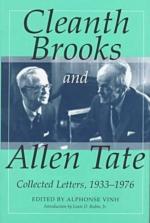|
This section contains 947 words (approx. 4 pages at 300 words per page) |

|
To save criticism from the scientists, Tate disengaged literature itself from society and men, and held up the inviolate literary experience as the only measure of human knowledge. Literature in this view was not only the supreme end; it was also the only end worthy of man's ambition. Critics who saw in works of literature "not the specific formal properties but only the amount and range of human life brought to the reader" were vulgar expressionists. Critics who studied literature as "expressive of substances" beyond itself were only historical scholars aping the positivism of science and remote from the crucial spiritual values to be derived from literature. Thus only Formalist criticism remained, to elucidate those "high forms of literature [which] offer us the only complete, and thus the most responsible, versions of our experience."
What one saw in Tate's system was a fantastic inversion of the Marxist system...
|
This section contains 947 words (approx. 4 pages at 300 words per page) |

|


